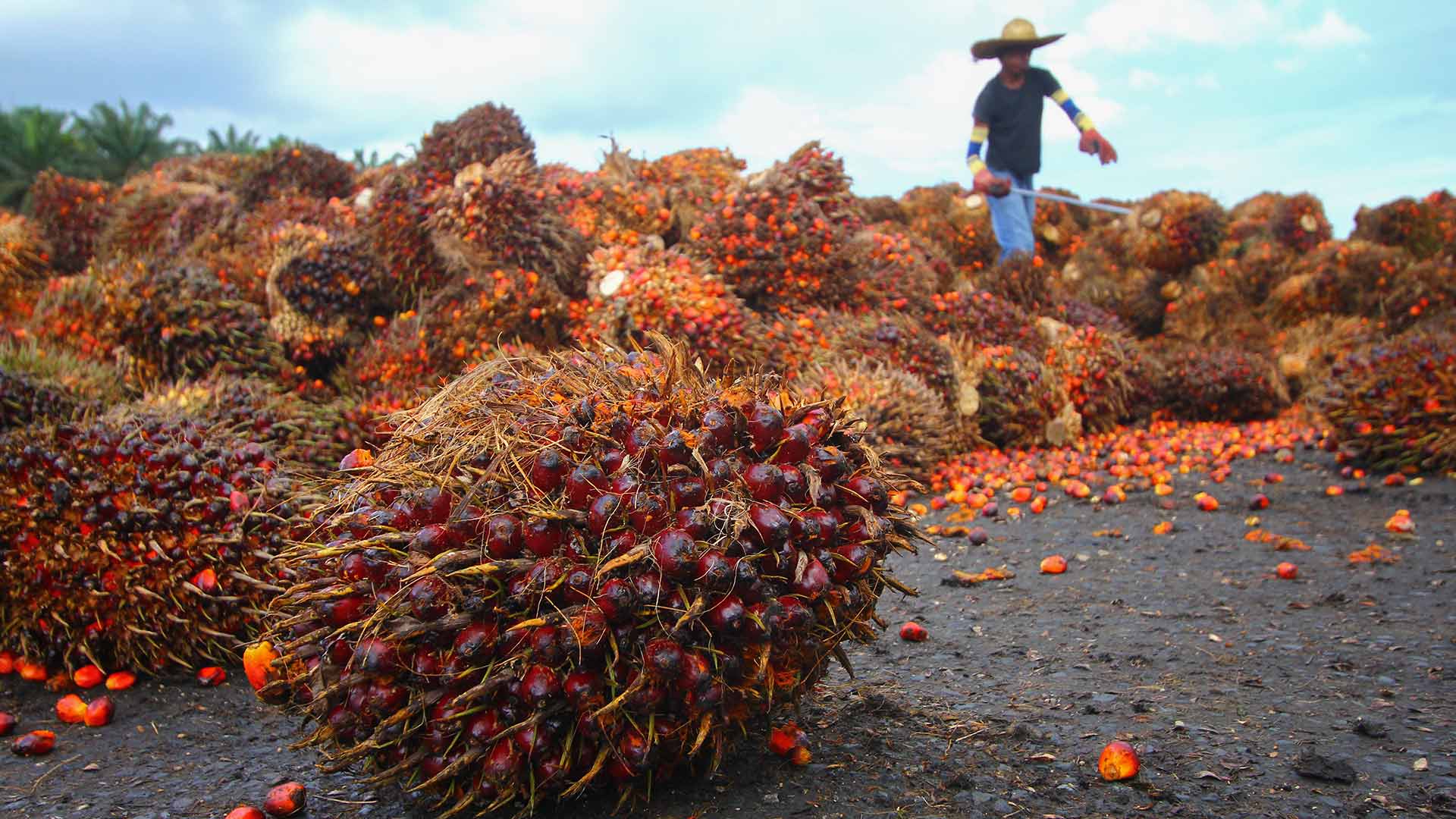Get the right experience for you. Please select your location and investor type.
IMPORTANT NEWS: Transition of investment management responsibilities
First Sentier Group, the global asset management organisation, has announced a strategic transition of Stewart Investors' investment management responsibilities to its affiliate investment team, FSSA Investment Managers, effective Friday, 14 November close of business EST.

Sustainable palm oil?
Recent forest fires across Malaysia and Indonesia cast a haze over many parts of Southeast Asia.
Driving these fires was the production of palm oil, one of the most widely used vegetable oils in the world.
Palm oil has a high resistance to oxidation and consequently a long shelf life, making it an ideal ingredient for a variety of products, from detergents to baked goods.
It can now be found in half of all products in a supermarket. It also produces higher yields per hectare compared to other oils, such as rapeseed, sunflower and soy.
Palm oil has become a major source of income for local communities and an important part of the rural economy in many countries.
However, rising demand has led to large-scale conversion of natural forest areas for plantations, resulting in carbon dioxide emissions, loss of high conservation value forests, soil erosion, air pollution, loss of biodiversity, as well as social conflict.
In an effort to address some of these challenges and promote the use of sustainable palm oil through credible global standards, the Roundtable for Sustainable Palm Oil (RSPO) was established in 2004.
There are four types of RSPO certified palm oil, and unfortunately the most common types, GreenPalm and Mass Balance, are not completely deforestation free.
The complete separation of certified and non-certified palm oil is expensive and difficult to achieve. Mass Balance is a cost-effective mixture of certified sustainable palm oil and non-certified palm oil.
GreenPalm allows manufacturers and retailers to buy GreenPalm certificates from an RSPO certified palm oil grower to offset each tonne of palm oil they purchase.
The two other types of RSPO palm oil are Segregated and Identity Preserved, which ensure higher levels of traceability and physical separation of certified and non-certified palm oil.
These are more expensive and not currently available in the quantities required by many large consumer companies. Speedy certification may not always be the answer to solve the issue.
Many companies now require RSPO certification as a minimum but are increasingly finding ways to build on RSPO criteria by working with suppliers to ensure additional protection against forest loss and degradation and social conflict.
An encouraging number of companies have made commitments to source sustainable palm oil.
Putting these goals into action can be arduous, as the palm oil supply chain is vast, complex and relies heavily on small processors and farmers whose palm oil is difficult to trace.
Unilever, one of the world’s largest buyers of palm oil, is working to source all of its palm oil from traceable and certified sources by 2020.
To achieve this target, they’ve started using a tool called Known Sources which allows them to gather information about suppliers and ensure compliance with their Supplier Code.
As of 2014, they achieved 70% traceability to known mills and have visibility of over 1,800 crude palm oil mills.
Henkel is another consumer company which has decided to phase out GreenPalm certificates and is working directly with suppliers to ensure they are at minimum Mass Balance certified.
Our approach to engagement is one that is always based on encouraging companies to protect long-term shareholder value.
Forest fires in Indonesia continue to heighten the focus on deforestation and the multinational consumer goods companies purchasing palm oil are an easy target for concerned stakeholders.
However, large volumes of palm oil are also purchased by emerging markets consumer companies.
Engagement with these companies can be more challenging because consumers are less engaged and NGOs (non-governmental organisation) less influential. However, we see this gradually starting to change.
While not targeting palm oil, Singapore supermarket operators, including Sheng Siong stopped sourcing paper products from listed company Asia Pulp & Paper due to concerns around their green credentials in light of the Indonesian forest fires.
We believe this may be a sign of things to come from a more environmentally engaged Asian community.
We are convinced that companies that choose to strengthen their supply chains will minimise risk and be better placed over the long run to deliver improved shareholder value.
Investment terms
View our list of investment terms to help you understand the terminology within this website.
Want to know more?
Important Information
This material is a financial promotion / marketing communication but is for general information purposes only. It does not constitute investment or financial advice and does not take into account any specific investment objectives, financial situation or needs. This is not an offer to provide asset management services, is not a recommendation or an offer or solicitation to buy, hold or sell any security or to execute any agreement for portfolio management or investment advisory services and this material has not been prepared in connection with any such offer. Before making any investment decision you should conduct your own due diligence and consider your individual investment needs, objectives and financial situation and read the relevant offering documents for details including the risk factors disclosure.
Any person who acts upon, or changes their investment position in reliance on, the information contained in these materials does so entirely at their own risk.
We have taken reasonable care to ensure that this material is accurate, current, and complete and fit for its intended purpose and audience as at the date of publication. No assurance is given or liability accepted regarding the accuracy, validity or completeness of this material.
To the extent this material contains any expression of opinion or forward-looking statements, such opinions and statements are based on assumptions, matters and sources believed to be true and reliable at the time of publication only. This material reflects the views of the individual writers only. Those views may change, may not prove to be valid and may not reflect the views of everyone at First Sentier Group.
Past performance is not indicative of future performance. All investment involves risks and the value of investments and the income from them may go down as well as up and you may not get back your original investment. Actual outcomes or results may differ materially from those discussed. Readers must not place undue reliance on forward-looking statements as there is no certainty that conditions current at the time of publication will continue.
References to specific securities (if any) are included for the purpose of illustration only and should not be construed as a recommendation to buy or sell the same. Any securities referenced may or may not form part of the holdings of First Sentier Group portfolios at a certain point in time, and the holdings may change over time.
References to comparative benchmarks or indices (if any) are for illustrative and comparison purposes only, may not be available for direct investment, are unmanaged, assume reinvestment of income, and have limitations when used for comparison or other purposes because they may have volatility, credit, or other material characteristics (such as number and types of securities) that are different from the funds managed by First Sentier Group.
Selling restrictions
Not all First Sentier Group products are available in all jurisdictions.
This material is neither directed at nor intended to be accessed by persons resident in, or citizens of any country, or types or categories of individual where to allow such access would be unlawful or where it would require any registration, filing, application for any licence or approval or other steps to be taken by First Sentier Group in order to comply with local laws or regulatory requirements in such country.
About First Sentier Group
References to ‘we’, ‘us’ or ‘our’ are references to First Sentier Group, a global asset management business which is ultimately owned by Mitsubishi UFJ Financial Group (MUFG). Certain of our investment teams operate under the trading names AlbaCore Capital Group, First Sentier Investors, FSSA Investment Managers, Stewart Investors and RQI Investors all of which are part of the First Sentier Group. RQI branded strategies, investment products and services are not available in Germany.
This material may not be copied or reproduced in whole or in part, and in any form or by any means circulated without the prior written consent of First Sentier Group.
We communicate and conduct business through different legal entities in different locations. This material is communicated in:
- Australia and New Zealand by First Sentier Investors (Australia) IM Ltd, authorised and regulated in Australia by the Australian Securities and Investments Commission (AFSL 289017; ABN 89 114 194311)
- European Economic Area by First Sentier Investors (Ireland) Limited, authorised and regulated in
- Ireland by the Central Bank of Ireland (CBI reg no. C182306; reg office 70 Sir John Rogerson’s Quay, Dublin 2, Ireland; reg company no. 629188)
- Hong Kong by First Sentier Investors (Hong Kong) Limited and has not been reviewed by the Securities & Futures Commission in Hong Kong. First Sentier Group, First Sentier Investors, FSSA Investment Managers, Stewart Investors, RQI Investors and Igneo Infrastructure Partners are the business names of First Sentier Investors (Hong Kong) Limited.
- Singapore by First Sentier Investors (Singapore) (reg company no. 196900420D) and this advertisement or material has not been reviewed by the Monetary Authority of Singapore. First Sentier Group (registration number 53507290B), First Sentier Investors (registration number 53236800B), FSSA Investment Managers (registration number 53314080C), Stewart Investors (registration number 53310114W), RQI Investors (registration number 53472532E) and Igneo Infrastructure Partners (registration number 53447928J) are the business names of First Sentier Investors (Singapore).
- United Kingdom by First Sentier Investors (UK) Funds Limited, authorised and regulated by the Financial Conduct Authority (reg. no. 2294743; reg office Finsbury Circus House, 15 Finsbury Circus, London EC2M 7EB)
- United States by First Sentier Investors (US) LLC, registered with the Securities Exchange Commission (SEC# 801-93167).
- other jurisdictions, where this document may lawfully be issued, by First Sentier Investors International IM Limited, authorised and regulated in the UK by the Financial Conduct Authority (FCA ref no. 122512; Registered office: 23 St. Andrew Square, Edinburgh, EH2 1BB; Company no. SC079063).
To the extent permitted by law, MUFG and its subsidiaries are not liable for any loss or damage as a result of reliance on any statement or information contained in this document. Neither MUFG nor any of its subsidiaries guarantee the performance of any investment products referred to in this document or the repayment of capital. Any investments referred to are not deposits or other liabilities of MUFG or its subsidiaries, and are subject to investment risk, including loss of income and capital invested.
© First Sentier Group


